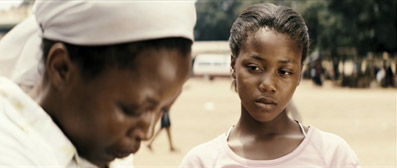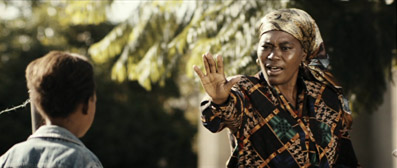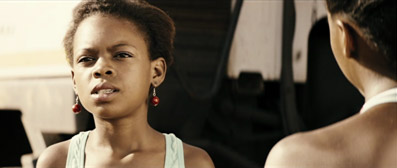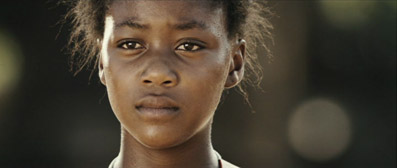| "It hurts all over. It hurts all the time. Except when I look at you." |
| The ailing Lilian to her daughter |
At a time when so many films choose to yell at the audience for the first ten minutes to ensure we'll stick with them for the character setups that follow, it's just a little thrilling to be blindsided by an opening scene that achieves a similar effect with a whisper. Such is the case with Oliver Schmitz's quietly arresting and impressively restrained drama of prejudice, social pressure and familial love, Life, Above All.
In an unspecified South African community, a woman sings a mournful song, isolated from the world outside of her window by the scope frame compositions and the stark contrast between the dark of her bedroom and sun-drenched street beyond. The camera focuses on seemingly insignificant detail: water dripping from washing, the design on a t-shirt, a sink full of unwashed pots. A young girl walks away from the house, a satchel on her back. We presume she's off to school. Seconds later she's sitting in a room and being asked by a man whether her parents will be coming. The logical assumption is that the man is a school official and the girl's parents have been summoned to discuss her misbehaviour or performance. She certainly doesn't look happy about this meeting and informs that man that her father is working and that her mother is unwell. The man asks about other relatives, but the girl seems unwilling to talk. Just what kind of trouble is she in? The man takes her hand and leads her to an adjacent room. It's full of coffins. "Don't worry," he tells her, "There are less costly ones." He opens another door and tells her, matter-of-factly, "There are all kinds of models for infants." He switches on the light and the girl stands before what is possibly the smallest coffin I've ever seen. Suddenly everything you've just seen falls sadly and powerfully into place. There's been a death in the family, a very recent one. A baby. And this girl is her sister and the singing woman her mother. I, for one, was frozen in mid-gasp. The quietest of scenes really can have the biggest of impacts.

The young girl is Chanda, and when she returns home her mother Lilian is still cradling the body of her deceased child. What did she die of? Lilian's friend and neighbour Mrs. Tafa tells Chanda it was influenza, but in a manner that suggests that they both know this is a lie. Lilian's drunken husband and Chanda's stepfather Jonah blames his wife for the death, slurring out accusations that she poisoned the child with her milk as he stumbles to the ground in an alcoholic daze, one from which he rarely emerges. People will judge you, Mrs. Tafa warns Chanda, just as they judged her when she lost her son. He was killed during a robbery, she reminds her, in the very same breath as the influenza claim. Jonah's other two children are protected from the truth and wonder where their sister might have chosen to hide. When the child is buried, the only member of Lilian's estranged family that comes to the funeral is her judgemental sister Ruth.
How much to reveal about what follows is another one of those tough calls I intermittently have to muse on, as the film remains deliberately cagey about a key element of the story for some time, though it seems likely that this is more a reflection of how it impacts on the community than an attempt to later catch the audience by surprise. Elsewhere on this disc it is openly discussed, but in the spirit of the film and the carefully worded synopsis on the back of this DVD, I'll let you discover that aspect for yourself. This does preclude me from commenting on it and how it impacts on the characters and their actions, and will thus cast some of the following in an ambiguous light. But if you really want to know what that core issue is then you won't have to look far – it's the feature of a good many of the film's reviews and interviews.

What I am able to comment on is the inspiring strength of the film's 12-year-old lead character. Faced with her mother's failing health and her father's alcoholism and repeated absence, it falls to her to keep the family together, not out of American movie-style spunky resilience, but as a pragmatic response to crisis, one born of earnest determination and a deep rooted love of her mother and siblings. On a practical level, this means hunting her drunken father down and grabbing money from his pocket to pay for her sister's funeral, or badgering medical staff to help her ailing mother and alcoholic stepfather. But it also means battling the fears and prejudices of judgemental locals, defiantly standing up to people who have the authority and physical strength to override her objections and even cause her physical harm.
What starts as an intriguing but seemingly unfocussed story of a family coping with tragedy develops into a study of the damaging effects of social prejudice and the strength of the mother-daughter bond. Here the film deviates from the cinematic norm by focussing on the filial rather than maternal instinct, on Chanda's inbuilt need to protect her mother regardless of the consequences. It doesn't help that Lilian is partially complicit in the reaction against her, a side-effect of growing up in a society in which intolerance is the norm (then again, in what society is it not to some degree?) and her own tradition-defying past, when she had the audacity to go against the expectations of her family and marry for love. Old superstitions die hard, and rather than seek medical help, the adults call on the services of an exorcist, a woman who puts on a histrionic show and claims to free the demon from Lilian's body with the sleight-of-hand release of a symbolic snake.
It's when Lilian's condition is confirmed that the seemingly disparate elements start to connect and make real sense. It's then that we understand just why her mother moves away to stay with her sister, why Mrs. Tafa is so reluctant to let Chanda speak to her by phone, and why almost everyone is hostile to Chanda's friendship with the rebellious Esther. But for Chanda, Esther is both her closest friend and her moral support, a solitary ray of light from which she draws strength. And when one of Tafa's disparaging comments about Esther turn out to be true, there's a real sense of betrayal, in spite of the social situation that almost drove her to this course of action. It's a turn of events that effectively isolates Chanda, and one of several story strands that dovetail into Lilian's plight.

This sense of isolation, coupled with an approach that views events exclusively from Chanda's viewpoint, quickly forges a bond between the audience and the film's determined young lead, and with the story revolving around her, there's a lot riding on 15-year-old Khomotso Manyaka, particularly given that this is her first film role and that she has had no theatrical training (she was talent-spotted when performing in a church choir). But Khomotso engages from the start, less through her dialogue delivery (fine though this is) but what she does between the lines, in her reactions to the words of others – the telling eye contact she makes at moments of conflict, the mournful contemplation of her mother's situation, and her defiant determination to do what is morally right for her mother in the face of local hostility. It's a wonderfully confident and naturalistic performance that landed Khomotso the Best Actress Award at the Durban International Film Festival and has attracted praise at a number of international festivals, including Cannes, where the film itself won the François Chalais Prize for life affirmation and journalism.
Only in the wish-fulfilment of the final scene does director Oliver Schmidt allow his bewitchingly understated blend of poetry and social realism to slip just a little, trading how events would probably play out for what we as an audience would like to see happen. But it still makes for a disarmingly uplifting sequence that delivers a positive message about understanding and social solidarity that I, for one, found easy to warm to. It may not quite deliver the high-powered emotional kick that producer Oliver Stoltz was looking for, but Life, Above All still tells a moving, involving and ultimately inspiring story, one that transcends its location and speaks directly to that special, unbreakable bond that us luckier souls have with the woman who cherished and raised us from birth.
Framed 2.35:1 and anamorphically enhanced, this is a typically strong Peccadillo transfer, one that attractively showcases Bernhard Jasper's evocative (and largely hand-held) scope cinematography and whose level of detail and finely balanced contrast survive the post-production colour timing well – there is some burn-out on some of the whites, but the skin tones (dark skin in bright sunlight is a real challenge for cinematographers and digital transfers alike) are always well judged. The film's brownish hue almost feels drawn from the skin tones of the main characters. As you would expect of a modern feature, the image is spotless throughout.

You can choose between Dolby 2.0 stereo and Dolby 5.1 surround, and while both are clear and boast a fine tonal range, there's a subtlety to the mix and use of ambient sound that gives the 5.1 track the edge. Somewhat oddly, some of Ali N. Askin and Ian Osrin's mood-capturing music appears to play at a slightly different pitch on both tracks.
Making of (14:07)
A slickly assembled mix of cast and crew interviews and behind-the-scenes footage that is up-front about the central themes (so don't watch this before the film), and provides a welcome peek at the cheerful enthusiasm and communal spirit that greeted the filmmakers and appears to have been a key aspect of the production.
There are a number of brief Interviews (28:54 total) with key members of the cast and crew, essentially longer versions of the snippets included in the above. Director Oliver Schmidt, director of photography Bernhard Jasper, co-producer Greig Buckle and producer Oliver Stoltz provide a few words about adapting the novel Chanda's Secrets, shooting in Elandsdoorn and the welcome they received from the locals, the atmosphere on set, making a film in a language that none of them speak, and the importance of opening up an African story to the west. Author of the original novel, Allan Stratton, talks about how the story came about, his delight at seeing his characters transformed from the page to the screen, and how much he admires what he's seen of the film (the interview was shot on location during the production). Enchanting young newcomer Khomotso Manyaka discusses landing the role of Chanda, the specifics of her character, and working with director Schmidt, whom she assures us was born to direct. The more experienced Lerato Mvelase (Lilian) and Harriet Lenabe (Mrs. Tafa) talk about the story, their characters, their previous acting experience, and the pleasures of working with the more inexperienced cast members. The most substantial and illuminating interview is with Dr. Hugo Tempelman, about whom I'll say no more to avoid spoiling things for those who prefer to let the film itself reveal the specifics of its social concerns.
Trailer (1:52)
A smartly assembled trailer that does give a little more away than you might prefer to see before sitting down for the main feature.
In some ways Life, Above All might seem a slight departure for specialist distributor Peccadillo (I'll just bet Artificial Eye are kicking themselves for not grabbing this one), but in its precision-pitched plea for tolerance and quiet celebration of the bonds of friendship and family, it may well have found the perfect home. Either way, this is a touching, sensitively handled and most impressively directed drama, one whose focus on the emotional journey undertaken by young Chanda transforms it from an issue picture into one in which the issue is an organically integrated component. The transfer is spot-on and the extras compliment the film well. Recommended.
|